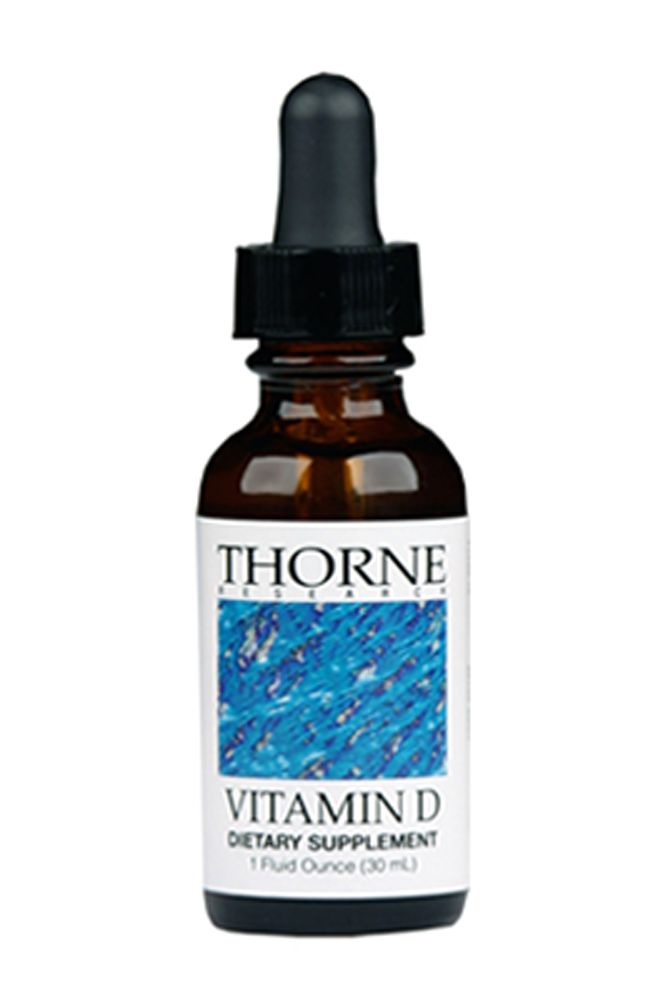Vitamin D3 Vegan drops
We prefer this brand because ...
These vegan Vitamin D drops have 500 IU of bioavailable vitamin D3, in a base of healthy medium chain triglyceride fats. Because vitamin D3 is a fat-soluble nutrient, the base enhances its assimilation. It has along stable shelf-life, and uses mixed natural tocopherols of the vitamin E family to maintain freshness. It is a purely vegan formulation, and is easy to take, with a minimal or mild flavor. We recommend that patients either place the drops on a teaspoon to see exactly how many are dispensed, or add them to a smoothie, apple sauce or yogurt. The drop dosing is very useful to allow each patient to choose an exact amount, especially if s/he needs an unusual dose such as 3,000 or 7,000 IU daily. It is also excellent for children and for adults who prefer not to swallow capsules.
About vitamin D3
Vitamin D3 is technically a hormone, a substance made in the body that travels in the blood to regulate its target tissues, rather than a vitamin which is a nutrient essential for life that we cannot make and must ingest from our diets. However, we very often cannot produce sufficient vitamin D of our own, so we generally need to take in supplemental amounts. Vitamin D is made in our skins when UVB ultraviolet light from sunshine converts 7-dehydro-cholesterol, a cholesterol derivative, into cholecalciferol. This is transported to the liver where it is converted into 25-hydroxycholecalciferol, a prohormone which is five times more active than cholecalciferol. In the kidneys this becomes 1,25-dihydroxycholecalciferol, which is ten times more effective than cholecalciferol, and the most potent form of vitamin D3. Liver or kidney disorders can impair the production of the most active vitamin D3 compounds. Vitamin D2 or ergocalciferol is made by plants, and is weaker, only about a third as effective for raising 25-hydroxycholecalciferol levels.
Vitamin D3 supplements are best absorbed when taken with a meal or snack including fat or oil, as D3 is a fat-soluble vitamin. Good fats in food stimulate bile acid, which D3 needs to be absorbed, as do vitamins A, E and K. Research at the Cleveland Clinic found that, at any dose, vitamin D3 reaches 50% higher blood levels when it is ingested with food. We recommend that patients take the same dose every day for four to six weeks before their blood levels reach a steady state when we test to measure levels, though larger doses large doses can be taken at one time, as vitamin D3 is slow-acting.
It is important to know that there is no standard dose: Each person has an individual dosing requirement: Our aim is to reach a blood level between 60 to 100 ng/mL. Recent research indicates that 70 to 85 may be ideal. The Vitamin D Council (VDC) is a non-profit organization of medical professionals and vitamin D researchers whose goal is to educate professionals and the public on the benefits of vitamin D and the risks associated with deficiency. The VDC recommends blood testing and dosing to achieve a level between 50 to 80 ng/mL. Lifeguards in south California, without sunscreen, reportedly have an average Vitamin D3 blood level of around 120ng/mL. Toxicity with blood levels of 350 or above is almost unheard of. It would mean taking about 50,000 IU a day for months before hypercalcemia (the initial manifestation of vitamin D toxicity) might occur. The one case we know of involved a family who took veterinary doses of D3. We start our patients with a modest dose of 2,000 or 4,000 IU daily, depending on their pre-treatment level, then wait four to six weeks to test. If blood levels are still too low we increase the dose, and weeks later test again. The commonest doses people need are 4,000, 6,000 or 8,000IU daily, but some need only 2,000 IU to achieve excellent blood levels and others need 12,000 IU or more.
Vitamin D3 has widespread benefits for many body systems and disorders: It works by entering cells and attaching to vitamin D receptors, which are within the cell nuclei. Once vitamin D3 locks into its receptor, the combination stimulates the cell's DNA to produce proteins that have specific jobs. Intestinal cells produce proteins that greatly increase the transport and absorption of calcium into the bloodstream. Bone, kidney and parathyroid gland cells are activated by vitamin D3 to regulate calcium and phosphorus balance for bone health. Vitamin D receptors are present in the brain, heart, colon, skin, prostate and breast tissues; also in blood vessel linings (the endothelium), and the pancreas. Vitamin D activates macrophage white blood cells and other key immune cells, when it binds to its receptors, to become an immune booster. The human genome has more than 2,700 binding sites for active D3; these receptors are located near genes that are involved in virtually every known major disease of humans.
Having sufficient body levels of vitamin D3 can significantly reduce the risk for colon, breast or prostate cancer, cold and flus, seasonal affective disorder, asthma, inflammatory and osteo-arthritis, heart disease, diabetes in babies if taken by the mother while she's pregnant, obesity, multiple sclerosis, and it is necessary to improve bone density and has a strengthening effect on muscles. See Solar D Gems for more details about the actions and benefits of vitamin D3.
Contents
4 drops provide: Vitamin D (as Vitamin D3) 2,000 IU.
Other Ingredients: Medium Chain Triglyceride Oil, Vitamin E as Mixed Tocopherols.
Free of: - This product does Not contain: artificial coloring, artificial flavoring, preservatives, parabens, gluten, dairy, corn, ingredients of animal origin, shellfish, egg, salt, sugar, soy, wheat, yeast
Cautions
Always take natural remedies under the supervision of your health care provider. Do not use 'Vitamin D Liquid' without consulting your physician if you have kidney disease, high blood calcium levels, hardening of the arteries or atherosclerosis, sarcoidosis, histoplasmosis, an overactive parathyroid condition (hyperparathyroidism), or lymphoma as vitamin D3 can affect calcium levels. Do not use 'Vitamin D Liquid' without the advice of your healthcare professional if you take diltiazem, Cardizem, or verapamil as changes in calcium levels may affect heart rhythm. Vitamin D is likely to be safe during pregnancy and breast-feeding, only at daily doses that maintain normal blood levels, which should be regularly checked by your physician; excessive doses may risk harm to the infant.
Testimonials

1 fluid oz
Benefits of Consistency
“With the right vitamins, herbs and foods, your health can continue to improve over time, as vibrant new tissues replace old cells. Our patients often feel increasing vitality as medical tests get better and better, year after year.”
- Dr. Rachelle Herdman







